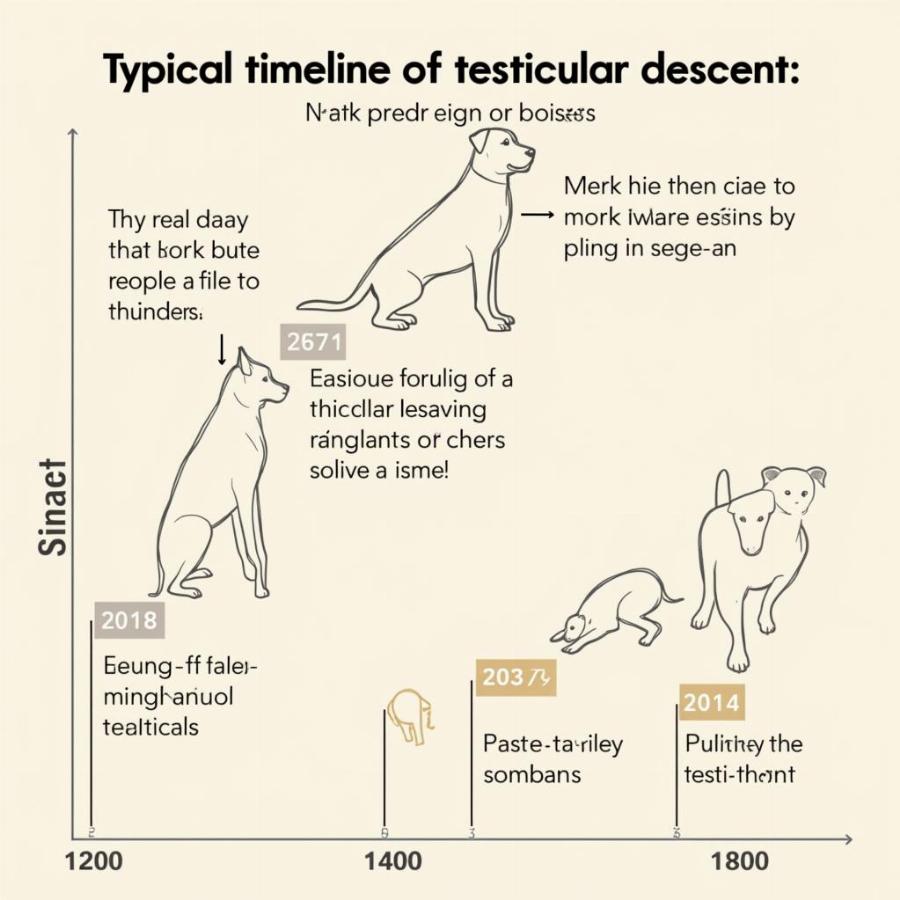Understanding the development of your male dog is a crucial part of responsible pet ownership. One common question new dog owners have is, “when do a dog’s balls drop?” Knowing the typical timeline for testicular descent can help you identify potential issues and ensure your furry friend receives the necessary veterinary care. This article will cover everything you need to know about this important milestone in your puppy’s life.
Understanding Testicular Descent in Puppies
The descent of the testicles, also known as testicular descent, is a natural process in male puppies. Ideally, both testicles should have descended into the scrotum by the time the puppy is six months old.
What is the Scrotum?
The scrotum is the external pouch of skin that houses the testicles. It plays a vital role in regulating the temperature of the testicles, keeping them slightly cooler than the body’s core temperature, which is essential for sperm production.
When Should I Expect My Dog’s Testicles to Drop?
Most puppies’ testicles will descend by the time they are eight weeks old, often even earlier. However, some puppies may take a little longer, up to six months.  Dòng thời gian phát triển tinh hoàn ở chó
Dòng thời gian phát triển tinh hoàn ở chó
What if My Dog’s Balls Haven’t Dropped?
If your puppy’s testicles haven’t descended by six months of age, it’s considered a condition called cryptorchidism. when do male dogs balls drop Cryptorchidism can be unilateral (one undescended testicle) or bilateral (both undescended). It’s important to consult your veterinarian if you notice this.
The Importance of Veterinary Checkups
Regular veterinary checkups are essential for monitoring your puppy’s development, including testicular descent. Your veterinarian can palpate the scrotum to check for the presence of the testicles during routine examinations. Early detection of cryptorchidism is crucial for preventing potential complications.
Why is Cryptorchidism a Concern?
Undescended testicles are at a significantly higher risk of developing tumors. dog eye conditions They are also more prone to torsion (twisting), which can be a painful and serious condition requiring emergency surgery.
What Happens if My Dog has Cryptorchidism?
If your dog is diagnosed with cryptorchidism, your veterinarian will likely recommend surgical removal of the undescended testicle(s). This is the standard treatment to prevent future health issues. dog keep shaking head
“Early detection and treatment of cryptorchidism are crucial for a dog’s long-term health,” says Dr. Emily Carter, DVM, a specialist in canine reproductive health. “While it can be a worrying diagnosis for owners, surgical removal of the undescended testicle(s) is a relatively straightforward procedure and greatly reduces the risk of serious complications.”
Caring for Your Dog After Neutering
If your dog has undergone surgery for cryptorchidism or routine neutering, proper post-operative care is essential for a smooth recovery. Keep the incision site clean and dry, and prevent your dog from licking or chewing the area. how to get rid of smelly dog ears
“Providing a comfortable and stress-free environment during recovery is just as important as the surgery itself,” advises Dr. Robert Miller, DVM, a seasoned veterinary surgeon. “Ensure your dog has a quiet space to rest and avoid strenuous activity until fully healed.”
Conclusion
Knowing when a dog’s balls drop is an important aspect of responsible pet ownership. Regular veterinary checkups and early detection of cryptorchidism are vital for ensuring your dog’s long-term health and well-being. tug toys for dogs By staying informed and proactive, you can provide the best possible care for your furry companion.
FAQ
- At what age should I start checking for my puppy’s testicles? You can start checking gently around 2-4 weeks of age.
- Is it normal for one testicle to drop before the other? Yes, it’s quite common for one testicle to descend before the other.
- Can a dog’s testicles retract? In some cases, a testicle may temporarily retract, especially in cold weather. However, it should readily descend again.
- Is cryptorchidism hereditary? Yes, there is a genetic component to cryptorchidism.
- Can a dog with cryptorchidism still breed? It’s strongly discouraged to breed a dog with cryptorchidism due to the hereditary nature of the condition.
- Is neutering a cryptorchid dog more complicated? The surgery is slightly more complex as the undescended testicle may be located within the abdomen.
- How long is the recovery period after cryptorchid surgery? Recovery is typically similar to routine neutering, around 7-14 days.